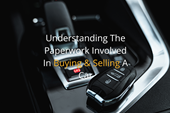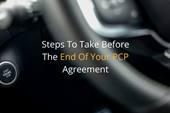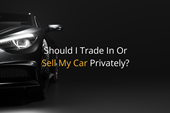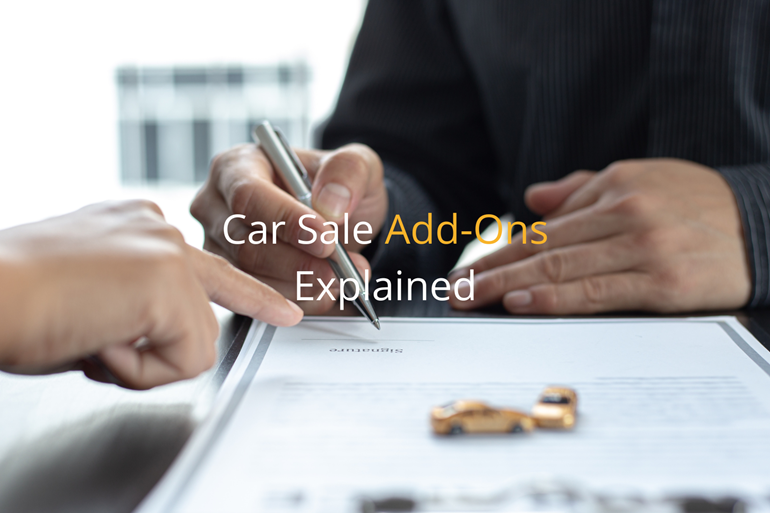
Car Sale Add-Ons Explained
Save Time & Money With Our Guide To Dealership Add-ons
Quick Links
- Introduction
- Are Dealership Add-Ons A Good Idea?
- Can I Cancel Dealership Add-Ons After Purchase?
- Car Sale Add-Ons Explained
- Tyre & Alloy Wheel Insurance
- SMART Repair Cover
- GAP Insurance
- Extended Warranty
- Paint Protection
- Servicing Plans
- Interior Insurance & Protection
- Dash Cams, Security Kits & Other Gadgets
- Our Final Word
Introduction
So, you've finally picked your dream car; maybe after weeks of scrolling, plenty of indecision and at least a couple of test drives, but just as you’re about to sign the dotted line, your salesperson leans in and says, “Let’s run through some of our optional extras?”
From alloy insurance to extended warranties, dealerships love to offer a buffet of extras once you’re already emotionally committed to the car. Some are genuinely useful. Others? Not so much. The key is knowing which ones protect your investment and which ones you can do without.
In this guide, we’re looking at the most common dealership ‘add-ons, deciphering their use (or lack thereof), plus what to look out for, so you can decide which, if any, are right for you.
First, though, let’s look at some of the basics.
Read More: If you haven’t found your dream car yet, take a look at The Only Car Buying Guide You’ll Ever Need.
Are Dealership Add-Ons A Good Idea?
Honestly? It depends.
We’re not totally against all dealership add-ons; some can be incredibly useful.
It’s only fair to at least entertain the idea of add-ons when it comes to finalising your car sale. Remember, salespeople have to earn a living too, and these days, transparency is key to their continual operation and success, so you shouldn’t be ‘ripped off’ with any optional extras.
Some offer peace of mind, such as protecting your vehicle against unexpected shortfalls. Others provide a means of keeping your car in top condition, and still others help spread the cost of regular maintenance.
As with most things, the perceived value depends on your preference and, on the whole, your attitude to risk.
Can I Cancel Dealership Add-ons After Purchase?
Most add-on products can be cancelled, without penalty, within 30 days. If you cancel within those 30 days and you haven’t used the add-on (such as claiming against your Tyre & Alloy protection, for instance), then you could be entitled to a full refund.
If you decide to cancel your policy after the 30-day ‘cooling off period’, you may be entitled to a pro-rata refund, although this is not always the case. In most cases, this is at the dealer’s discretion.
If you’ve used your add-on product (such as a SMART Repair), you’ll most likely forfeit any refund, regardless of when you bought it.
There may be administration fees for refunds or cancellations. Our advice is to brush up on your Consumer Rights and, before committing to anything, ask outrightly, ‘Can I cancel this if I change my mind?’
Car Sale Add-Ons Explained
Tyre & Alloy Wheel Insurance
It’s no secret that most UK roads are in a sorry state, which can be brutal on your wheels. Kerbs, potholes, and uneven speed bumps can cause damage that not only ruins the look of your beloved new car, but could be dangerous too.
Tyre & Alloy Insurance generally provides cover for damaged wheels and tyres, including punctures. The level and detail of which depends on the cover you choose.
What It Usually Covers
- Repairs or replacement for damaged alloy wheels, including refurbishment.
- Puncture repairs or replacement tyres due to accidental damage.
Things To Look Out For
If you’re considering Tyre & Alloy Insurance, check how many wheels and tyres can be repaired and ask if there’s any limit on the value of repair to each wheel. It’s ok having a policy, but if it only pays £50 towards the repair of a £200 wheel, then it’s not much use.
Ask your dealership whether repairs can be performed by a mobile technician. A mobile technician can make all the difference, especially if your tyre damage means a complete flat tyre.
SMART Repair Cover
SMART stands for ‘Small to Medium Area Repair Technology,’ which is essentially a minor cosmetic fix for scratches, dings, and bumper scuffs.
It’s handy if you’re meticulous about your paintwork or plan to hand the car back at the end of a PCP agreement, for example, where cosmetic damage can cost you in penalties.
Things To Look Out For
Just make sure the provider covers your area (many use mobile technicians), and always ask about the size and depth limits. A lot of policies won’t touch anything bigger than a credit card, whereas some will repair areas up to 25cm.
Don’t forget to check on the claim limits, too.
GAP Insurance
Gap Insurance (or Guaranteed Asset Protection) covers the difference between your car’s current market value and what you originally paid for it, or the remaining finance amount in the event it’s written off or stolen.
Example: If your insurer offers £12,000 after a total loss, but you owe £17,000 on finance, GAP fills in that missing £5k.
It can be especially relevant for drivers who choose finance, such as PCP, leasing or HP agreements, as well as those who’ve bought brand new cars (which typically depreciate at a faster rate, meaning a greater risk of negative equity).
Gap insurance from dealerships became synonymous with being overpriced, which is why most drivers now look online. There are plenty of other reasons why you shouldn’t take out Gap Insurance from your motor dealer, too.
Free Tool: Try our Car Depreciation Calculator.
Things To Look Out For
Over recent years, the FCA has created stringent rules to prevent the mis selling of Gap Insurance through dealerships. When you’re buying your car, here are a few things to look out for when the dealer discusses Gap:
- Time to think about it: Dealerships have to give a two-day ‘cooling off period’ before selling you Gap Insurance. If they want you to sign there and then, they’re breaking the rules, and you should walk away.
- Other options: The dealership should tell you that you don’t have to buy through them and also make you aware of other options such as buying gap insurance online.
If you do decide to buy through a dealership, make sure you check claim limits, the average time it takes for a claim to be settled and if there are any charges for transferring your policy.
Extended Warranty
Extended warranties cover mechanical and electrical faults beyond the standard manufacturer's warranty.
They can be a god send for worried drivers, especially those driving cars that are maybe on the higher end of parts and labour costs. That said, most dealership warranties come with a few ‘catches’ such as certain make and model exclusions, maximum value repairs and an obligation to have your car serviced with them.
What To Look Out For
If you decide to opt for an extended warranty through your dealership, make sure you’re absolutely clear on what’s covered and what isn’t. With this in mind, ensure you’re given time to read the policy in full before you commit.
Ask your dealership about any stipulations, such as where you can have repairs done, any labour costs involved and the servicing requirements needed to uphold the validity of your warranty.
A few other things to think about, too: check whether your policy is an ‘Insured Warranty’. If it isn’t, you aren’t fully covered by the FCA and Financial Ombudsman Service.
It’s worth checking your original manufacturer's warranty as well, sometimes it could overlap your extended warranty, which means you’re paying for something you don’t need.
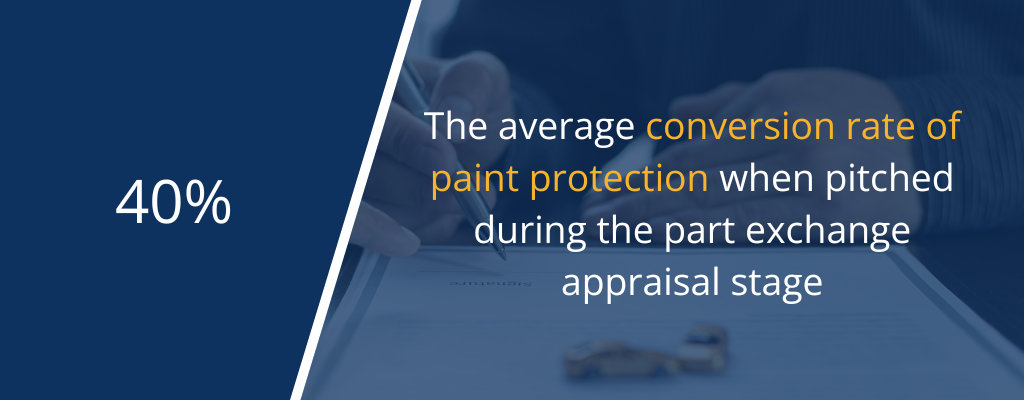
Source: https://www.am-online.com/independents/insight/how-used-car-dealers-can-maximise-add-on-profits
Paint Protection
Paint protection is sold under a myriad of different brand names, all usually pitched as a miracle shield against bird droppings, tree sap, UV damage and general grime.
You can get the same ceramic coatings, or better, from professional valeters, often for less.
That said, if you really don’t want to think about waxing or cleaning your car often, and the cost is bundled sensibly into the deal, it’s not entirely worthless. Just know what you’re buying.
What To Look Out For
If you do decide to take out paint protection (which isn’t a bad idea), make sure there’s some level of proof, such as a sticker in your service book or accompanying certificate. You can use this at a later stage when selling your car.
Servicing Plans
Service plans can be genuinely helpful, especially for new car owners who want to spread the cost of maintenance.
Most plans let you pay monthly or upfront for a set number of services (usually one per year), sometimes with extras thrown in like MOTs, discounts on parts, or even breakdown cover.
If you do decide to roll your service plan into monthly payments, as part of your car finance, research whether there’s interest accrued on them.
Here’s where a service plan can be useful:
- You like things to be predictable: Using a service plan gives more predictability over long-term costs, with fewer unexpected fees.
- You want today's prices: Most dealerships sweeten the deal by locking in all your services at current prices, meaning you could save against future price rises.
- You plan to service at the dealer: A service plan ties you in to the same dealer, which can be a good thing if you like familiarity and their customer service.
What To Look Out For
Just check what’s included. Some “service plans” only cover oil changes and inspections, not the cost of filters, fluids, or spark plugs.
As we mentioned above, if you decide to include your service plan with your car finance, be sure you fully understand that interest may accrue. That’s not necessarily a ‘bad thing’, just something to be aware of.
As always, make sure you’re comfortable with the monthly payments before you commit.
Interior Insurance & Protection
Interior cover is less common, but you might see this pop up, covering spills, stains, burns, or damage to your car’s seats, trim, or carpets.
It can be useful if you’ve got young kids, a dog, or a frequent habit of eating in the front seat. But again, check the pay-out caps. You may be better off just budgeting for a good professional valet once or twice a year.
And, of course, if you’ve opted for a service plan (and you’re cheeky enough), you could probably get a free valet every time you visit the dealership.
Dash Cams, Security Kits, and Other Gadgets
Some dealers try to upsell GPS devices, dash cams, or security kits. They can be useful, but in most cases, they’ll be massively overpriced.
Don’t feel like you need to buy them through the dealership. A decent dash cam from Halfords or Amazon will cost half as much and might even come with better features.
Our Final Word
Dealership add-ons can be a mixed bag. Some are 100% worth it. Others are there because they’re profitable. The trick is figuring out which ones are useful to you.
Remember to follow our key takeaways and you’ll not go too far wrong:
- Ask for written details on every add-on
- Don’t feel pressured to buy on the spot
- Compare costs with outside providers
- Only buy what fits your life, not the salesperson’s script
Because when it comes to spending your hard-earned cash, the best extras are the ones *you* choose, not the ones you’re talked into.
We hope you’ve enjoyed reading, and we hope this article helps clarify the confusing world of dealer add-ons. If it’s helped you, please share it with your network. You can even use the Pinterest friendly image below!
Pin It!




